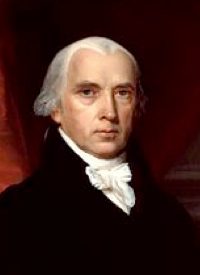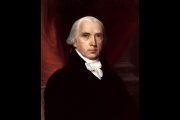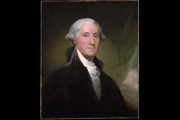
Celebrate the 261st birthday of the Father of the Constitution. Visit with Mr. Madison in his home throughout the day.
Attend a poignant wreath presentation ceremony in the Madison Family Cemetery at 1:30 p.m. The United States Marine Corps will present the Presidential Wreath from President Barack Obama, followed by additional wreath layings and remarks from John A. Ragosta, Resident Fellow, Virginia Foundation for the Humanities. “Is James Madison still speaking to us about religious freedom?” Please follow the signs to the Visitor Center, park, and walk to the Cemetery.
In the Mansion — Montpelier’s curatorial team honors Madison’s 261st birthday with the public unveiling of the newly refurnished study, called Mr. Madison’s Room by nineteenth-century visitors to Montpelier. House tours begin at 9:30 a.m.
In the Grand Salon — The Center for the Constitution launches ConText, an online, crowd-sourced commentary of Notes of Debates on the Federal Convention of 1787. Presentation will begin at 11:00 a.m.
The American Boys Choir —Perform the National Anthem on the Mansion Portico after the Wreath-laying Ceremony at 2:00 p.m.
How kind of President Obama to be mindful enough to send a wreath to mark the occasion.
Physically, James Madison was unimpressive. At just under five feet six inches tall with a weak voice and a somewhat delicate constitution (he suffered from hypochondria), Madison did not strike an imposing figure, unlike Washington and Jefferson both of whom were physically superior to him. Madison’s life, however, is a lesson in overcoming one’s physical impediments and not allowing such to retard the intellectual growth and influence one may achieve through self-discipline and honest, consistent study and work. Although painfully shy socially, Madison never shied away from taking upon himself the burdens of earnest thought and planning that others found unbearable.
Madison’s early education came at the feet of tutors who, fortunately for Madison, were energetic, zealous, and eager to quench young Madison’s constant thirst for knowledge. One of his early teachers was Donald Robertson, a brilliant but stern professor who followed the old Scottish tradition of “dispensing learning with a burr.” At the Robertson school Madison, as all young men of his day, was expected to learn Latin and Greek with what by today’s standards would be extraordinary proficiency. Records indicate, however, that during his first year under the tutelage of Robertson, Madison’s Latin was too weak to permit enrollment in many of the classes he most desired, so he was compelled to begin his studies in English. In a manner typical of his perpetual quest for self-improvement, Madison redoubled his efforts to learn Latin and in fact learned the language so well, years later while studying international law as Secretary of State, he was able to make corrections to the English translations of Latin works by Grotius, Pufendorf, and Vattel.
Next, to prepare his young son for college, Madison’s father employed the services of a young and able Scot — Thomas Martin. Martin was a recent graduate of the College of New Jersey at Princeton, and he brightly reflected much of the intellectual vigor and zeal of the New Light Presbyterians who guided that institution. It is likely that Mr. Martin’s example and exciting stories of life at Princeton encouraged James Madison to depart from the Virginia tradition of sending young men to William and Mary for their higher education and to set his sights on Princeton. Of course, the fact that the president of Princeton, John Witherspoon, was a schoolman pressed from the same stern, Scottish mold as Madison’s mentor Donald Robertson probably made the decision to attend Princeton an easier one and likely filled Madison with eager anticipation.
As was the case with his earlier teachers, John Witherspoon played a substantial role in the formation of Madison’s character and political thought. Witherspoon was a teacher renowned for the keenness of his wit and the ardor of his intellectual enthusiasm. Witherspoon encouraged the students of Princeton to examine all sides of an issue and to become well-armed in defense of whatever they thought was “right” and be equally able to logically deconstruct that which they believed to be “wrong.”
While at Princeton, Madison continued studying natural law and politics by immersing himself in the works of many luminaries of the 17th and 18th centuries, most notably Grotius, Pufendorf, Barbeyrac, Burlamaqui, Hobbes, Machiavelli, Locke, and Sidney. It is indisputable that all of this exposure to the brightest of the world’s political thinkers served as oxygen to the raging fire of intellectual vitality that would define Madison’s professional life.
Madison’s professional life was one of public service: as a state legislator in his home state of Virginia, a member of the Continental Congress, a member of the House of Representatives, Secretary of State under Thomas Jefferson, and President of the United States of America. With all this, however, James Madison served his country best when he served as a delegate from Virginia to the Convention of 1787 in Philadelphia. Originally styled as a meeting convened to overhaul the impotent Articles of Confederation, Madison arrived in Philadelphia firmly convinced that the only hope of maintaining the freedom America had won at so great a price was to dismantle the malfunctioning infrastructure of the Articles and in its place construct a new, republican government dynamic enough to perform it’s necessary duties and restrained enough to avoid infringing upon the liberty that was central to the American political heritage.
Four months after beginning their deliberations, the delegates produced the Constitution. This was a constitution to be ordained and established by “we, the people” therefore a copy of it was sent to all the state legislatures to be ratified. The vote would be up or down on ratification and a super-majority of nine states was needed for passage. The ratification of the Constitution was a precarious proposition. The large states of Virginia and New York were keystones upon which the stability of the arch of Union depended. Toward convincing the people of New York to vote for pro-Constitution delegates to the ratifying convention, Alexander Hamilton, a young, energetic lawyer from New York engaged the help of fellow New Yorker John Jay and James Madison in authoring letters to the editors of four New York newspapers, letters that would become classics in political thought — the Federalist Papers.
In his contribution to the Federalist Papers, Madison warned of the danger of factions, the absolute requirement of separation of powers, and how a only a republican government could withstand the pressures of self-government that crushed other confederacies.
In Federalist Number 10, Madison defined faction as “a number of citizens, whether amounting to a majority or minority of the whole, who are united and actuated by some common impulse of passion, or of interest adverse to the rights of other citizens, or to the permanent and aggregate interests of the community.” Have we not been the witnesses of factions of both major political parties passing laws that rob us of our God-given liberties? Whether Republican or Democrat, there is a habitual trend in our elected representatives to unite in the removal of our Republic from the cornerstones of liberty laid by Madison and his colleagues.
One of the chief cornerstones upon which our federal government was built was the separation of powers, on this topic Madison wrote in Federalist Number 47 that “the accumulation of all powers legislative, executive, and judiciary in the same hands, whether of one, a few or many, and whether hereditary, self-appointed, or elective, may justly be pronounced the very definition of tyranny.” Again, are we not daily witnesses of the accumulation of all power by the executive branch, whether by the President himself or through the morass of regulations promulgated by the bureaucracy?
Finally, within the first paragraph of Federalist Number 39, Madison succinctly observed, “It is evident that no other form [other than republican] would be reconcilable with the genius of the people of America or with the fundamental principles of the revolution.” This insight should inform all of those who insist that America is a “democracy” or try to enact democratic institutions into the American system of government.
Perhaps all of us may remember Madison on the 16th by doing something to remind those in Washington that we are watching and will not allow them to destroy the Constitutional Republic that Madison helped found.



